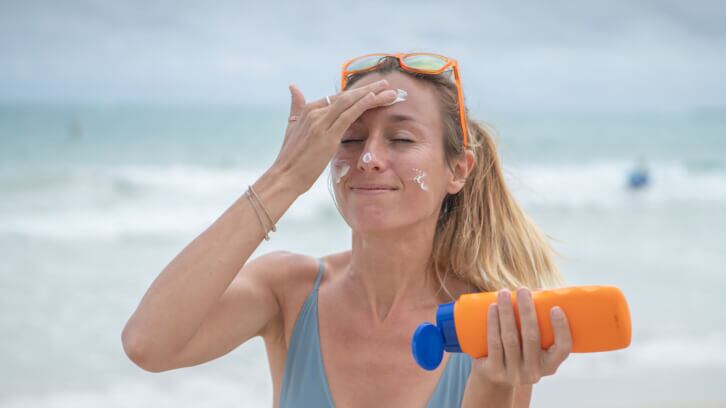The fact that the topical application of suncare products poses a risk to waterways and marine environments is putting pressure on brands to come up with solutions that have less impact on aquatic life and the environment as a whole.
Going beyond this, suncare players also need to think about the overall carbon footprint of the products they develop, making biodegradable and waterless formulations important, while also not overlooking switching up packaging materials.
Responding to consumers’ sustainability demands
To find out about how this impacts the facial suncare space, we spoke to Anna Keller, Mintel’s Senior Global Beauty Analyst, who has been observing this space in order to shed some light on the right moves to make in the context of mounting consumer concerns over sustainability.
“While the sunscreen space has leveraged eco-minded claims that focus on ocean and reef safety for years, the reality of rapidly warming oceans and marine environment destruction forces consumers and brands to change the focus and consider other critical facets of the sustainability movement - particularly carbon footprint, biodegradability and packaging materials,” said Keller.
As average temperatures rise worldwide and extreme weather become more commonplace, consumers awareness and interest in sustainable solutions is growing, prompting them to make positive changes to that avoid contributing to the problem.
Suncare sustainability claims are on the rise
Mintel’s Global New Product Database highlights this, with 34% of global suncare launches having sustainable claims, compared to just 8% in 2018, while 39% of US consumers aged 24 – 34 currently say they are making more effort to buy suncare products that are not harmful to the environment.
“The majority of sunscreen products offered today are applied topically and destined to ultimately end up in an aquatic environment,” said Keller.
“Alternative formats and application methods, including ingestible supplements, can help improve protection from the sun while also reducing the direct impact of sunscreen formulations on the planet.”
More meaningful eco-friendly claims
While packaging has long been the easiest aspect of sustainability to latch on to, simply because it is easier for consumers to relate it to the environment, growing awareness about the causes of climate change and environmental damage is leading to demand for more meaningful changes.
Keller believes that by making the effort to improve the sustainability profile of products, suncare brands will stand out more in the space and increase their appeal.
“In the BPC space, sustainable innovation has largely focused on eco-friendly packaging, but more eco-minded claims must be considered as the climate crisis evolves,” said Keller
“Lead sustainable NPD in suncare to go beyond conventional packaging material claims with ethos-driven stories and marketing that will appeal across generations.”
A new generation of suncare products
As an example of this different kind of approach, the Mintel research points to KLĒNSKIN Wash On sunscreen, which offers an SPF 30 protection in a daily facial wash format, making its application easier by combining the sunscreen in a multitasking skincare product.
The research also highlights ingestible suncare supplements, which could spell both a more sustainable and more effective future for the category. Advances in this area make sunscreen use more convenient, while also reducing the risk of pollution, factors that should see enable significant category growth in coming years, Keller believes.
Examples of newer suncare supplement launches include Sundaily’s The Base Layer, which includes plant-based antioxidants to fight against the aging effects of UV light and air pollution, as well as Korean brand UVlipse which claims to offer photodamage protection that goes beyond conventional topical products.
Mintel’s recommendations for sustainability claims
- · Single dose biodegradable capsules - claims: waste reduction, convenience/transportability, avoids over consumption
- · Waterless or concentrated products - claims: water conscious beauty, powder/solid formats, reduced carbon footprint (from shipping)
- · Alternative packaging materials (ie aluminum) - claims: plastic-free, increased recyclability, improve biodegradability/reduce microplastics

